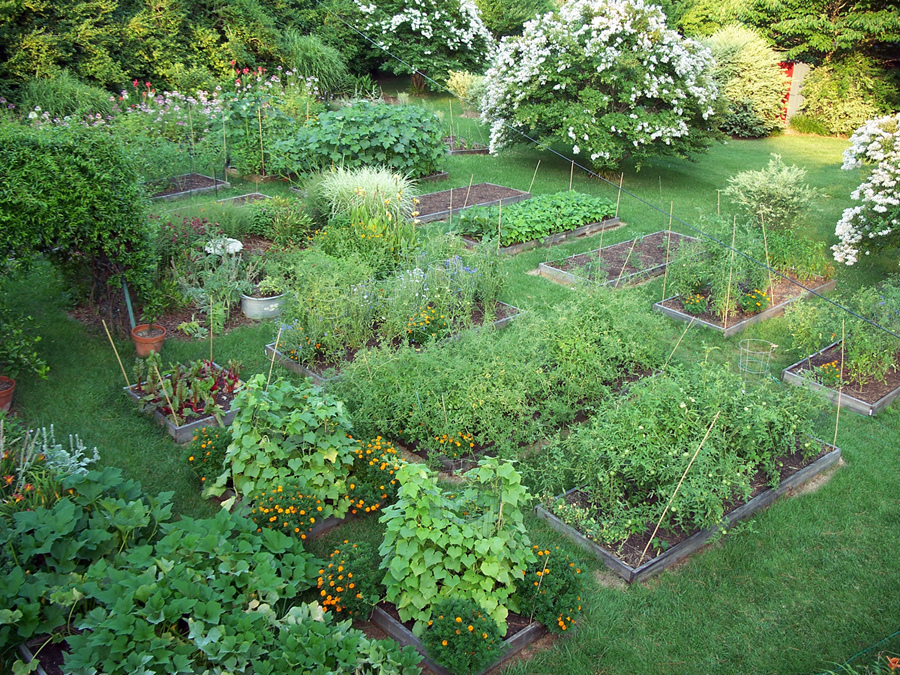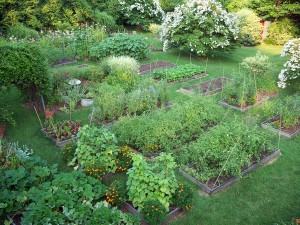by Christi Shi
Charlotte’s local food system faces significant challenges as development patterns continue to extend its rural-urban fringe outward from the population center. But in the face of these challenges, new opportunities are emerging. The local food system is showing signs of life and new producers and infrastructure initiatives are taking root.
Consider for example, Small City Farm. Operating on a half acre within the Charlotte city limits, Kim Shaw has become a full-time urban farmer.
Although Kim spent her summers picking and packing produce for restaurants in Hilton Head throughout childhood, she didn’t actually set out to farm as an adult. Instead, she entered the food and beverage industry, most recently serving as the director of catering at a country club in Charlotte.
But growing food was still on her mind. She kept a home garden and was instrumental in starting the garden that now feeds the guests at the Club. So, when her position at the Club was eliminated during the summer of 2007, Kim launched her new career as a farmer. She began growing in August and was selling stir-fry greens, beets, carrots, and kale at the local farmers’ market by October.
Since then, she’s been growing seasonally to sell at the Charlotte Tailgate and the state-sponsored Yorkmont Road Farmers’ Markets. Kim has green garlic, lamb’s lettuce, edible flowers, salad mixes and herbs growing for the spring. And this summer she’ll be selling her okra, White Currant cherry tomatoes and pink Arkansas Travelers. She grows all of this in her collection of two dozen 4-foot by 12-foot raised beds in her backyard, with the help of her husband, Rohan Gibbs.
Small City Farm is located just four miles from South Park and eight miles from Uptown. Located in the middle of a quiet neighborhood, Small City Farm looks like any other residential lot. From the front, at least. Walk around back and you’ll see a bounty of vegetables, edible flowers, and herbs. But since she doesn’t retail from the house, one would have no way of identifying it as a farm from the street.
Farming in a residential neighborhood is certainly different from farming in a rural area. Kim uses raised beds instead of row cropping. She turns to her tiller instead of a tractor. And when she hauls produce to market, you’ll find her driving her Cooper Mini rather than a pickup truck. But in many ways she faces the same challenges as other farmers. She has to fend off the deer that come in from an adjoining rail corridor. She relies on a nearby beekeeper in the area for pollinators. And she has to balance her production with consumer demand.
But unlike many rural farmers, Kim has the additional challenge of a very small space. As a result, Kim must be especially careful with her selection of plants. She grows fewer long-season items such as root vegetables. And she takes advantage of Rohan’s access to a greenhouse at his full-time off-farm job. She’s learned a lot on the small plot, but now Kim is looking for more land.
Ideally, she would like to have five acres within the Charlotte city limits. But she’s also looking in outlying areas where the cost of land isn’t so expensive. In the interim, Kim is working with other urban growers to bring vacant land (especially tracts owned by churches, schools, and municipalities) into cultivation. Here too, there are challenges that all farmers face: where to get water and how to keep critters (both 4-footed and 2-footed varieties) out of the fields. And unlike the rural areas, where farming is farming is farming, urban populations often envision community gardens, rather than a bona fide farm, when asked about food production in the city. Kim believes that there is a need to focus on urban farming and bring together resources and support for growers who are not just growing in their backyard for their own kitchen table, but for market customers.
While her full-time farming job isn’t providing a full-time income yet, Kim views it a great way to pay for a hands-on degree in horticulture. And she has learned a lot, not just about growing, but also about marketing.
Kim attributes much of her learning to the assistance of other farmers. Maria Fisher, of Fisher Farms in Stanley County, has served as a mentor to Kim. So have others such as Jennifer and Dean Mullis of Laughing Owl Farm in Stanley County, Donnie Cline of Lincoln County, and Nise Smart of Nise’s Produce. From these more seasoned farmers, Kim has learned how to navigate the challenges of market farming in the Charlotte area.
For example, the state-run Yorkmont Road Farmers’ Market requires a grower’s certificate but doesn’t require all things sold to be produced by the seller. Farmers can drive to other states and pick up produce that is less expensive and then resell it for profit. Because these farmers can get wholesale prices on these crops, they are able to undercut the prices of those who are growing on a smaller scale. As a result, local growers like Kim face competition that often prevents them from getting a fair price on their products.
The widespread abuse of the term “local” is an issue for all of our community farmers. Kim, located within the city limits, is local for sure. Yet someone reselling watermelons from Georgia can claim that their product is local as well. Truly local farmers encourage consumers to ask questions when they visit the farmers’ markets to ensure they’re really supporting the local economy.
The challenge of defining local extends to restaurants as well. Kim sells her products to restaurants that list local ingredients on their menus. But she sees slippery language on menus touting support of local farms. The phrase “when possible” makes an appearance too often; Kim encourages consumers to hold the food service industry accountable on their local claims, too.
Kim notes that the Charlotte area has a lot of potential with regard to local food. But Charlotte has lacked the widespread consumer zeal that areas such as Asheville and Chapel Hill bring to the table. She recognizes that her survival as an urban farmer depends upon people in Charlotte understanding that buying local food does not mean buying from a grocery store; it means buying from a farmer.
You can be a member, too! Join CFSA today. We’re 2,300 farmers, ranchers, consumers, gardeners, activists all working together to help sustainable family farms thrive!



